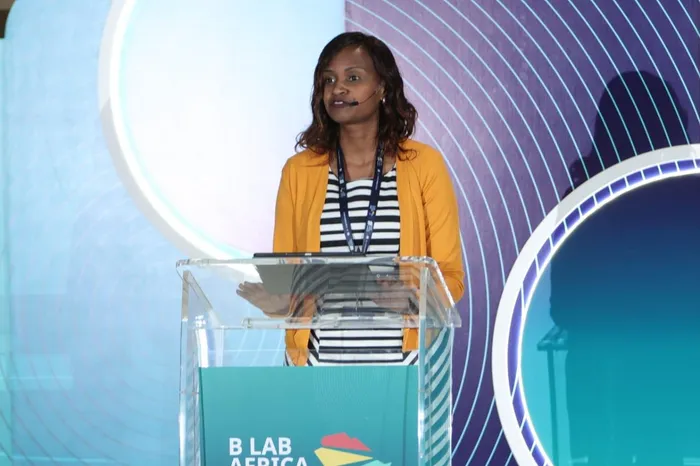Africa ready to lead on climate action, but calls for homegrown solutions: B Lab Africa

B Lab Africa CEO Lucy Muiga pointed to Africa’s youthful population, abundant natural resources, and entrepreneurial spirit as key assets in addressing the climate crisis.
Image: Supplied
The 4th Annual B Lab Africa Summit has heard that the continent is increasingly ready to take action to mitigate against climate change, provided solutions are African-led and tailored to local realities.
Africa remains the continent hardest hit by the impacts of climate change despite contributing just 4% of global carbon emissions. Africa requires an estimated $277 billion annually until 2030 to implement climate solutions.
Speaking during the Summit on Thursday, B Lab Africa CEO Lucy Muiga pointed to Africa’s youthful population, abundant natural resources, and entrepreneurial spirit as key assets in addressing the climate crisis.
“Is Africa ready? Yes. Do we still have a long way to go? Yes, but the solutions for Africa are with Africans,” Muiga said.
“The question before us is not whether Africa can rise to the challenge. The question is whether we are ready to act, together, with the speed, scale, and inclusivity required to secure our future.”
The B Lab Africa Summit is widely regarded as a premier platform for businesses, investors, and policymakers committed to building an equitable and sustainable Africa.
Muiga highlighted that while international support was important in mitigating climate change in the continent, Africa must invest in itself and drive its own agenda.
“We cannot depend too much on global players. It is time for Africa to step up,” Muiga said, urging governments and businesses to mobilise local capital and innovation rather than waiting for wealthier nations.
On the contentious issue of energy transition, Muiga stressed the need for a gradual and country-specific approach.
With South Africa still generating over 90% of its power from coal, the reopening of Komati Power Station underscored the challenges of balancing energy security, jobs, and sustainability.
“There is no one-size-fits-all solution. What works in Ethiopia, with its reliance on hydro, won’t work in coal-dependent South Africa. Transitions must be just, inclusive, and locally designed,” she said.
Agriculture was identified as one of the most vulnerable sectors. From floods in Kenya to drought in the Sahel and cyclones in southern Africa, climate shocks are threatening livelihoods.
Experts called for practical interventions such as irrigation systems and financial support for smallholder farmers to strengthen resilience.
On the contentious issue of energy transition, Muiga stressed the need for a gradual and country-specific approach.
With South Africa still generating over 90% of its power from coal, the reopening of Komati Power Station underscored the challenges of balancing energy security, jobs, and sustainability.
“There is no one-size-fits-all solution. What works in Ethiopia, with its reliance on hydro, won’t work in coal-dependent South Africa. Transitions must be just, inclusive, and locally designed,” she said.
Agriculture was identified as one of the most vulnerable sectors. From floods in Kenya to drought in the Sahel and cyclones in southern Africa, climate shocks are threatening livelihoods.
Experts called for practical interventions such as irrigation systems and financial support for smallholder farmers to strengthen resilience.

The Business of Agriculture: A panel discussion about how Africa can achieve food security while tackling climate shocks and building resilient farming systems at the B Lab Africa Summit on Thursday.
Image: Supplied
Sifiso Skenjana, an economist and managing director at ESG Analytics, said Africa must seize the opportunities of the global green economy while preparing for risks ranging from shifting US trade policy to carbon markets and critical minerals demand.
Skenjana warned that Africa risks being sidelined if it does not set clear policies for carbon markets, safeguard its resources, and write its own rules.
He said the rise of “carbon colonialism” was a cause for concern.
Under Article 6 of the Paris Agreement, wealthy nations can offset emissions by buying credits from developing countries, often without addressing their own pollution.
"Ultimately what happens is that the biggest emitters just look for offshoring their responsibility without actually meeting the issue itself," Skenjana said.
"I think we're a little behind in offering the legislation and policy direction that this kind of green future, sustainable future, means in our context. In this global shift, Africa must think differently. By aligning its resources, youthful population, and entrepreneurial energy with smart policy and innovation, the continent can turn today’s drumbeats of disruption into tomorrow’s growth opportunities.”
The session also touched on Africa’s energy transition and the return of energy-intensive data centres. With South Africa still heavily coal-reliant, balancing sustainability with energy security was flagged as an urgent challenge.
Former Statistician-General, Dr Pali Lehohla, was critical of some of South African government's decision when it comes to the Just Energy Transition Programme (JETP).
Lehohla cited the Prime Minister of Barbados, Mia Amor Mottle, who told the general debate of the General Assembly’s 80th session last week that the fossil fuel industry is not the enemy – it is the emissions.
He said the $8.5 billion earmarked for South Africa's JETP between 2023 and 2027 has been unaccounted for but the government had rushed to closed down and repurpose the coal-fired Komati Power Station in Mpumalanga nonetheless.
"Nobody has accounted for that $8.5bn that's helped to close down Komati, that's helped to say that the fleet is old and cannot be maintained. Nobody has answered that question. They made sure that Komati is closed so that the British, the Americans, and everybody else can be happy," he said.
"That was a mistake. We have to understand that. Who closed it? Who instructed it? Because behind that problem were people who lost jobs, who lost families. We cannot let it continue like that. Emissions are the problem, not fossil fuel."
BUSINESS REPORT